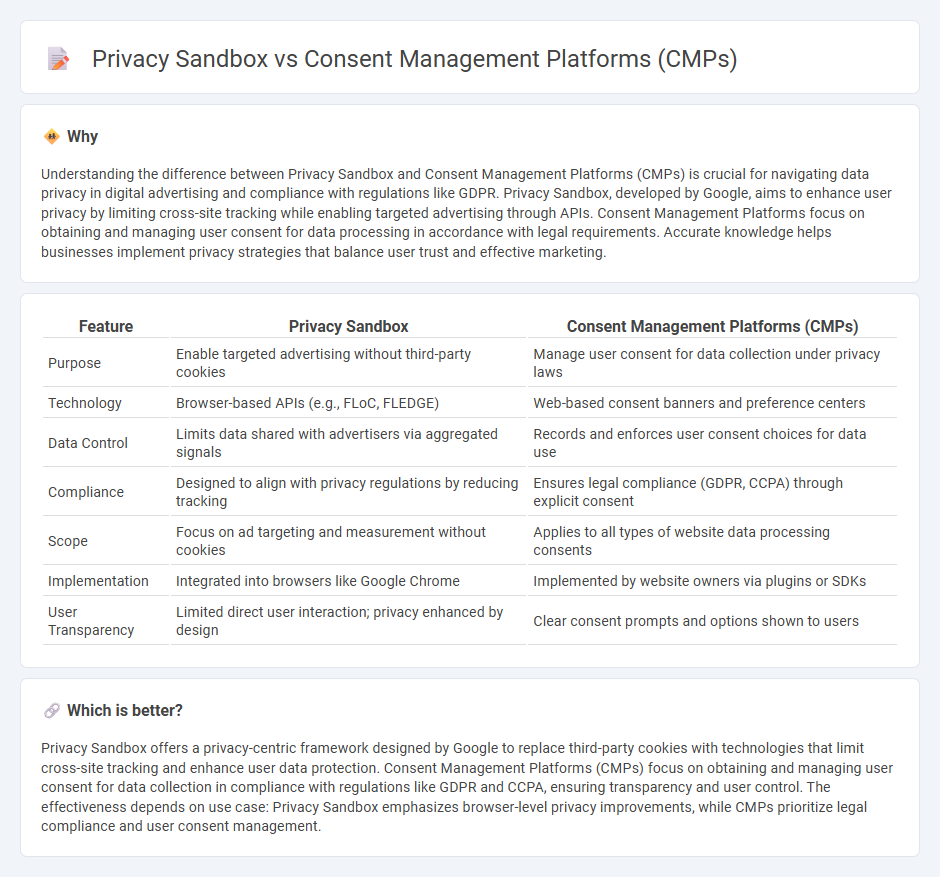
Privacy Sandbox targets enhancing user privacy by limiting cross-site tracking through browser-based solutions developed by Google. Consent Management Platforms (CMPs) focus on compliance with data protection regulations by managing user consents for cookies and data processing across websites. Discover how these technologies shape the future of digital privacy and user control.
Why it is important
Understanding the difference between Privacy Sandbox and Consent Management Platforms (CMPs) is crucial for navigating data privacy in digital advertising and compliance with regulations like GDPR. Privacy Sandbox, developed by Google, aims to enhance user privacy by limiting cross-site tracking while enabling targeted advertising through APIs. Consent Management Platforms focus on obtaining and managing user consent for data processing in accordance with legal requirements. Accurate knowledge helps businesses implement privacy strategies that balance user trust and effective marketing.
Comparison Table
| Feature | Privacy Sandbox | Consent Management Platforms (CMPs) |
|---|---|---|
| Purpose | Enable targeted advertising without third-party cookies | Manage user consent for data collection under privacy laws |
| Technology | Browser-based APIs (e.g., FLoC, FLEDGE) | Web-based consent banners and preference centers |
| Data Control | Limits data shared with advertisers via aggregated signals | Records and enforces user consent choices for data use |
| Compliance | Designed to align with privacy regulations by reducing tracking | Ensures legal compliance (GDPR, CCPA) through explicit consent |
| Scope | Focus on ad targeting and measurement without cookies | Applies to all types of website data processing consents |
| Implementation | Integrated into browsers like Google Chrome | Implemented by website owners via plugins or SDKs |
| User Transparency | Limited direct user interaction; privacy enhanced by design | Clear consent prompts and options shown to users |
Which is better?
Privacy Sandbox offers a privacy-centric framework designed by Google to replace third-party cookies with technologies that limit cross-site tracking and enhance user data protection. Consent Management Platforms (CMPs) focus on obtaining and managing user consent for data collection in compliance with regulations like GDPR and CCPA, ensuring transparency and user control. The effectiveness depends on use case: Privacy Sandbox emphasizes browser-level privacy improvements, while CMPs prioritize legal compliance and user consent management.
Connection
Privacy Sandbox and Consent Management Platforms (CMPs) are connected through their shared goal of enhancing user privacy while enabling compliant data collection. Privacy Sandbox introduces new web standards that limit cross-site tracking, requiring CMPs to adapt their consent frameworks to ensure transparent user data processing. This integration helps businesses maintain compliance with regulations like GDPR and CCPA while leveraging privacy-preserving advertising technologies.
Key Terms
User Consent
Consent Management Platforms (CMPs) enable websites to collect, store, and manage user consent for data processing in compliance with GDPR and CCPA regulations, ensuring clear and granular user control over personal data. Privacy Sandbox, developed by Google, aims to enhance user privacy while enabling targeted advertising through anonymized and aggregated data techniques without relying on third-party cookies. Explore the evolving landscape of user consent management to understand how these technologies shape privacy and advertising strategies.
Data Privacy
Consent Management Platforms (CMPs) enable businesses to obtain, manage, and document user consent for data collection, ensuring compliance with GDPR and CCPA regulations. Privacy Sandbox, developed by Google, aims to phase out third-party cookies by introducing privacy-preserving APIs that limit cross-site tracking while still enabling targeted advertising. Explore how these evolving tools balance user privacy with effective marketing strategies to stay ahead in data privacy.
Third-Party Cookies
Consent Management Platforms (CMPs) enable websites to collect, store, and manage user consent for data processing, ensuring compliance with privacy regulations like GDPR and CCPA, particularly in the context of third-party cookies. Privacy Sandbox, introduced by Google, aims to phase out third-party cookies by providing privacy-preserving APIs that facilitate targeted advertising without exposing individual user data. Explore the evolving landscape of third-party cookie alternatives and their impact on digital advertising.
Source and External Links
10 of the best Consent Management Platforms (CMPs) - CMPs help websites collect, manage, and store user consent for data processing, ensuring compliance with laws like GDPR, ePrivacy Directive, and CCPA by displaying consent banners, tracking preferences, and controlling cookie behavior.
Consent Management Platform (CMP): How to Choose - A CMP automates the collection and management of user consent for personal data processing, detecting and blocking cookies until consent is granted, securely storing consent records, and sharing consent signals with third-party vendors for regulatory compliance.
consentmanager - The leading Consent Management Platform (CMP) for GDPR - consentmanager is a customizable, GDPR/ePrivacy/CCPA-compliant platform with multi-language support, automatic cookie detection, Google certified consent mode, and integration with over 2,500 tools for global businesses.
 dowidth.com
dowidth.com